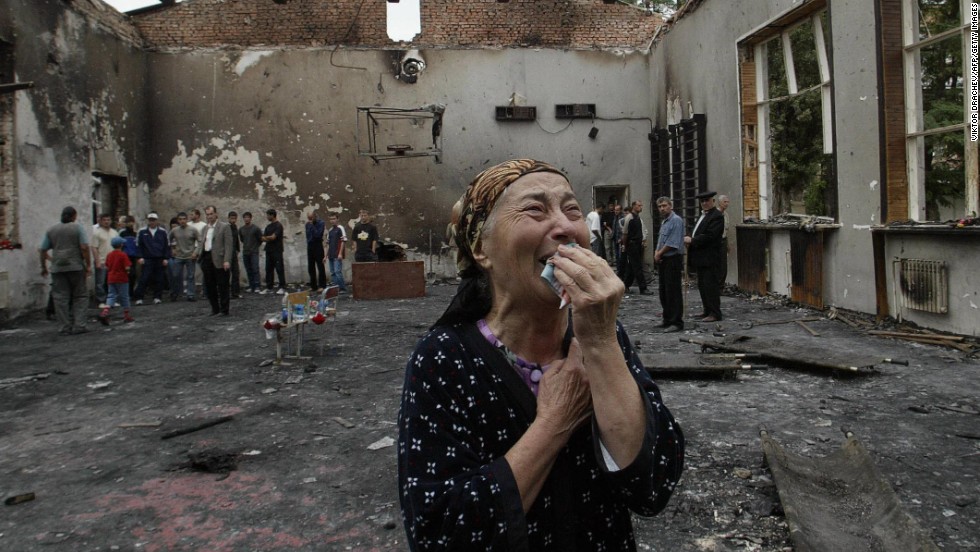
Serious failings in the response of the Russian authorities to the Beslan attack
The case concerned the September 2004 terrorist attack on a school in Beslan, North Ossetia (Russia). For over fifty hours heavily armed terrorists held captive over 1,000 people, the majority of them children. Following explosions, fire and an armed intervention, over 330 people lost their lives (including over 180 children) and over 750 people were injured. The case was brought by 409 Russian nationals who had either been taken hostage and/or injured in the incident, or are family members of those taken hostage, killed or injured. They made allegations of a range of failings by the Russian State in relation to the attack.
In the case of Tagayeva and Others v. Russia (application nos. 26562/07, 14755/08, 49339/08, 49380/08, 51313/08, 21294/11 and 37096/11), the European Court of Human Rights made the following findings.
Unanimously, the Court held that there had been a violation of Article 2 (right to life) of the European Convention on Human Rights, arising from a failure to take preventive measures. The authorities had been in possession of sufficiently specific information of a planned terrorist attack in the area, linked to an educational institution. Nevertheless, not enough had been done to disrupt the terrorists meeting and preparing; insufficient steps had been taken to prevent them travelling on the day of the attack; security at the school had not been increased; and neither the school nor the public had been warned of the threat.
Unanimously, the Court found that there had been a violation of the procedural obligation under Article 2, primarily because the investigation had not been capable of leading to a determination of whether the force used by the State agents had or had not been justified in the circumstances.
By five votes to two, the Court held that there had been a further violation of Article 2, due to serious shortcomings in the planning and control of the security operation. The command structure of the operation had suffered from a lack of formal leadership, resulting in serious flaws in decisionmaking and coordination with other relevant agencies.
By five votes to two, the Court also found that there had been a violation of Article 2 arising from the use of lethal force by security forces. In the absence of proper legal rules, powerful weapons such as tank cannon, grenade launchers and flame-throwers had been used on the school. This had contributed to the casualties among the hostages and had not been compatible with the requirement under Article 2 that lethal force be used “no more than [is] absolutely necessary.”
Taking into account the compensation already afforded to the victims in Russia and various domestic procedures that had been aimed at establishing the circumstances of the events, the Court held, by six votes to one, that there had been no violation of Article 13 (right to an effective remedy).
Under Article 46 (binding force and implementation of judgments), the Court indicated the need for a variety of measures aimed at drawing lessons from the past, raising awareness of applicable legal and operational standards, and deterring similar violations in the future. It also held that the future requirements of the pending investigation into the incident must be determined with regard to the Court’s conclusions about investigation’s failures to date.
Salvis Juribus – Rivista di informazione giuridica
Direttore responsabile Avv. Giacomo Romano
Listed in ROAD, con patrocinio UNESCO
Copyrights © 2015 - ISSN 2464-9775
Ufficio Redazione: redazione@salvisjuribus.it
Ufficio Risorse Umane: recruitment@salvisjuribus.it
Ufficio Commerciale: info@salvisjuribus.it
***
Metti una stella e seguici anche su Google News
The following two tabs change content below.
Avv. Giacomo Romano
Ideatore e Coordinatore at Salvis Juribus
Nato a Napoli nel 1989, ha conseguito la laurea in giurisprudenza nell’ottobre 2012 con pieni voti e lode, presso l'Università degli Studi di Napoli Federico II, discutendo una tesi in diritto amministrativo dal titolo "Le c.d. clausole esorbitanti nell’esecuzione dell’appalto di opere pubbliche", relatore Prof. Fiorenzo Liguori. Nel luglio 2014 ha conseguito il diploma presso la Scuola di specializzazione per le professioni legali dell'Università degli Studi di Napoli Federico II. Subito dopo, ha collaborato per un anno con l’Avvocatura Distrettuale dello Stato di Napoli occupandosi, prevalentemente, del contenzioso amministrativo. Nell’anno successivo, ha collaborato con uno studio legale napoletano operante nel settore amministrativo. Successivamente, si è occupato del contenzioso bancario e amministrativo presso studi legali con sede in Napoli e Verona. La passione per l’editoria gli ha permesso di intrattenere una collaborazione professionale con una nota casa editrice italiana. È autore di innumerevoli pubblicazioni sulla rivista “Gazzetta Forense” con la quale collabora assiduamente da giugno 2013. Ad oggi, intrattiene collaborazioni professionali con svariate riviste di settore e studi professionali. È titolare di “Salvis Juribus Law Firm”, studio legale presso cui, insieme ai suoi collaboratori, svolge quotidianamente l’attività professionale avendo modo di occuparsi, in particolare, di problematiche giuridiche relative ai Concorsi Pubblici, Esami di Stato, Esami d’Abilitazione, Urbanistica ed Edilizia, Contratti Pubblici ed Appalti.
Latest posts by Avv. Giacomo Romano (see all)
- Trasferimento Medicina per salute, avv. Romano: nuova immatricolazione all’UniME - 17 February 2025
- Ricorso Università Medicina, trasferimento a Napoli per salute: l’avv. Romano vince - 14 December 2024
- Ricorso Università Odontoiatria, trasferimento a Sassari per salute: l’avv. Romano vince - 14 December 2024







